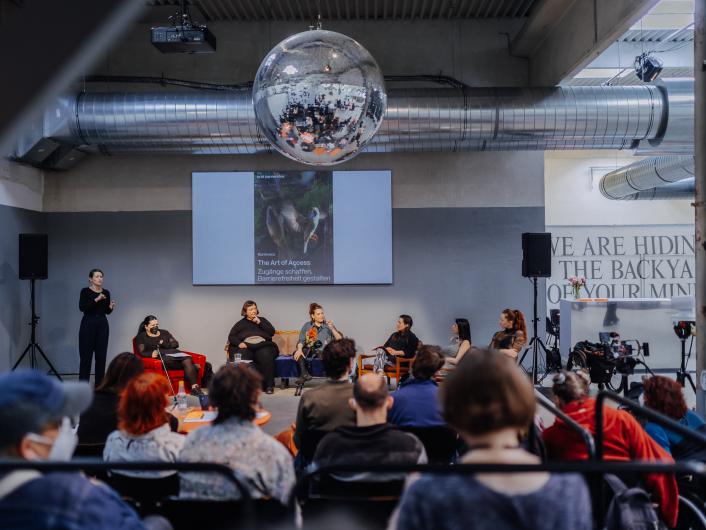Tanja Erhart & Elisabeth Magdlener
Becoming Allies: How to Access Rider
Workshop on Accessibility, Inclusion and Participation in the Arts and Culture
Becoming Allies is a cross-institutional networking meeting inviting everyone interested in advancing accessibility, inclusion, and participation in the arts and culture. Within the framework of this workshop, we will focus on the Access Rider – a document that, on the one hand, makes the accessibility requirements of artists with disabilities visible, and on the other hand enables organizers to provide transparent access information.
The starting point of the workshop are short impulses drawn from the current situation: structures of power and violence that continue to hinder the inclusion and participation of artists with disabilities in the arts and cultural sector. Adopting a cultural studies perspective, we will explore what ableism and inclusion mean for ourselves and for our work in the field of arts and culture.
Furthermore, we will reflect on our shared visions for the arts and cultural landscape: What sustains and guides our work? How can we shape a collective, inclusive way of being and working together in the arts? How do we imagine collaboration — and what requires change? At the heart of the workshop lies the question: How to be an ally?
The workshop is open to both professionals working in institutions and artists who have already engaged with the Access Rider or wish to do so.
The aim of the workshop is to establish a first foundation that understands accessibility and inclusion as prerequisites for fair collaboration and open dialogue between artists and institutions. We will explore initial practical approaches for artists to create an Access Rider, while also discussing which access measures and barriers need to be made visible by institutions to enable truly accessible working conditions.
Elisabeth Magdlener is a scholar, artist, and advocate working at the intersection of queer and disability studies. As a dancer and long-time member of the international community dance movements DanceAbility and A.D.A.M. (Austrian DanceArt Movement, she explores inclusive and transformative practices in the arts. Elisabeth Magdlener is the author of Cripping Dance? Potenziale und Ambivalenzen im inklusiven Tanz and is currently completing the university programme Inclusion and Transformation (since 2023).
Tanja Erhart (she/her) loves to dance, choreograph, curate and collaborate in Crip Spacetime. She’s a white, crip*queer activist and dancer of multiple bodyminds. Tanja Erhart is co-director of the new dance collective LIFT. 2026 they will premier their first dance piece in Berlin and Vienna including the aesthetics of access. How to lusciously care and provide access for each other is central to her being trouble. Therefore, she’s very much into rest and retreat spaces as well as snack tables in the dance studio.
Accessibility
We kindly ask all participants to take a COVID test in advance and to attend the workshop only with a negative result.
During the workshop, there will be plenty of breaks for resting, eating, and drinking.
The venue – WUK Foyer – is fully wheelchair accessible. The WUK courtyard is paved with cobblestones, while the path from the main entrance on Währinger Straße to the information office is smooth and without paving.
Assistants, accompanying persons, and assistance dogs can be registered via performingarts@wuk.at.
Further information on accessibility at WUK can be found HERE. For any questions, please contact Ulli Koch (ulli.koch@wuk.at).
Credits
As part of brut accessible
A collaboration between WUK performing arts and brut Wien
Dates & Tickets
November 2025
Fully booked
WUK performing arts
Währinger Straße 59, 1090 Vienna

